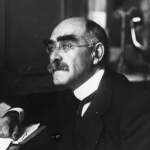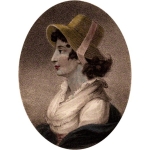An Epistle to Mr. Cuthbert Jackson
This motley piece to you I send,
Who always were a faithful friend;
Who, if disputes should happen hence,
Can best explain the author’s sense;
And, anxious for the public weal,
Do, what I sing, so often feel.
The want of method pray excuse,
Allowing for a vapored Muse;
Nor to a narrow path confined,
Hedge in by rules a roving mind.
The child is genuine, you may trace
Throughout the sire’s transmitted face.
Nothing is stolen: my Muse, though mean,
Draws from the spring she finds within;
Nor vainly buy what Gildon sells,
Poetic buckets for dry wells.
School-helps I want, to climb on high,
Where all the ancient treasures lie,
And there unseen commit a theft
On wealth in Greek exchequers left.
Then where? from whom? what can I steal,
Who only with the moderns deal?
This were attempting to put on
Raiment from naked bodies won:
They safely sing before a thief,
They cannot give who want relief;
Some few excepted, names well known,
And justly laurelled with renown,
Whose stamp of genius marks their ware,
And theft detects: of theft beware;
From More so lashed, example fit,
Shun petty larceny in wit.
First know, my friend, I do not mean
To write a treatise on the spleen;
Nor to prescribe when nerves convulse;
Nor mend th’ alarum watch, your pulse.
If I am right, your question lay,
What course I take to drive away
The day-mare Spleen, by whose false pleas
Men prove mere suicides in ease;
And how I do myself demean
In stormy world to live serene.
When by its magic lantern Spleen
With frightful figures spreads life’s scene,
And threat’ning prospects urged my fears,
A stranger to the luck of heirs;
Reason, some quiet to restore,
Showed part was substance, shadow more;
With Spleen’s dead weight though heavy grown,
In life’s rough tide I sunk not down,
But swam, ’till Fortune threw a rope,
Buoyant on bladders fill’d with hope.
I always choose the plainest food
To mend viscidity of blood.
Hail! water-gruel, healing power,
Of easy access to the poor;
Thy help love’s confessors implore,
And doctors secretly adore;
To thee, I fly, by thee dilute—
Through veins my blood doth quicker shoot,
And by swift current throws off clean
Prolific particles of Spleen.
I never sick by drinking grow,
Nor keep myself a cup too low,
And seldom Cloe’s lodgings haunt,
Thrifty of spirits, which I want.
Hunting I reckon very good
To brace the nerves, and stir the blood:
But after no field-honors itch,
Achieved by leaping hedge and ditch,
While Spleen lies soft relaxed in bed,
Or o’er coal fires inclines the head,
Hygeia’s sons with hound and horn,
And jovial cry awake the morn.
* * *
To cure the mind’s wrong bias, Spleen,
Some recommended the bowling-green;
Some, hilly walks; all, exercise;
Fling but a stone, the giant dies;
Laugh and be well. Monkeys have been
Extreme good doctors for the Spleen;
And kitten, if the humor hit,
Has harlequinned away the fit.
* * *
If spleen-fogs rise at close of day,
I clear my evening with a play,
Or to some concert take my way.
The company, the shine of lights,
The scenes of humor, music’s flights,
Adjust and set the soul to rights.
Life’s moving pictures, well-wrought plays,
To others’ grief attention raise:
Here, while the tragic fictions glow,
We borrow joy by pitying woe;
There gaily comic scenes delight,
And hold true mirrors to our sight.
Virtue, in charming dress arrayed,
Calling the passions to her aid,
When moral scenes just actions join,
Takes shape, and shows her face divine.
* * *
sometimes I dress, with women sit,
And chat away the gloomy fit;
Quit the stiff garb of serious sense,
And wear a gay impertinence,
Nor think nor speak with any pains,
But lay on fancy’s neck the reins;
Talk of unusual swell of waist
In maid of honor loosely laced,
And loving pair with sep’rate bed,
And jewels pawned for loss of game,
And then redeemed by loss of fame;
Of Kitty (aunt left in the lurch
By grave pretence to go to church)
Perceived in hack with lover fine,
Like Will and Mary on the coin:
And thus in modish manner we,
In aid of sugar, sweeten tea.
Permit, ye fair, your idol form,
Which e’en the coldest heart can warm,
May with its beauties grace my line,
While I bow down before its shrine,
And your thronged altars with my lays
Perfume, and get by giving praise.
With speech so sweet, so sweet a mien,
You excommunicate the Spleen.
* * *
















Comment form: